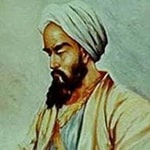Rhazes (Abu Bakr Muhammad ibn Zakariyya al-Razi)
 Abu Bakr Mohammad Ben Zakariyā Rāzi born in the year 865 in the city of Rey, is an Iranian scholar, doctor, philosopher and chemist, famous for the discovery of alcohol, sulfuric acid and kerosene and according to George Sarton, father of the history of science, he was "the greatest doctor of Iran and the Islamic world in the centuries of the Middle Ages".
Abu Bakr Mohammad Ben Zakariyā Rāzi born in the year 865 in the city of Rey, is an Iranian scholar, doctor, philosopher and chemist, famous for the discovery of alcohol, sulfuric acid and kerosene and according to George Sarton, father of the history of science, he was "the greatest doctor of Iran and the Islamic world in the centuries of the Middle Ages".
Rāzi spent his childhood, adolescence and youth in Rey; he was so gifted that as a young man he played the lute and sometimes composed poetry. Later he devoted himself to the goldsmith's art and then to alchemy and in old age he taught medicine.
Rāzi is among the doctors whose intuition is still used today in medicine, in particular in the treatment of the sick with liquids and food. Doctors and researchers have used Rāzi's books and treatises over many centuries. Ibn Khallikān, Arturo Castiglioni etc. mentioned him as the progenitor of empirical doctors. It can be said that Rāzi is among the first doctors to have introduced experience and experiment into medicine and the first to have declared the recognition of a separation between smallpox and measles. Although he is known as a famous physician, some historians know him by the name of "surgeon".
Rāzi undertook the study of chemistry before medicine and can be said to be the progenitor of modern chemistry.
Rāzi was a man of good character and scrupulous. He had particular attention to the sick and was very helpful with the poor. Rāzi, unlike many doctors who were inclined to heal kings, princes and dignitaries, had more relations with ordinary people. He believed that an authoritative physician must also be a philosopher; he did not follow the popular philosophical currents of his time, he had his own particular ideas and therefore in the end he found himself being vilified by the followers of the philosophy of his time and also of the one after him. Rāzi can be considered the most authoritative rationalist and empiricist in Iranian culture. In metaphysics and cosmology too he has his principles. In the collection of Mohammad Zakariyā Rāzi's works, 271 books, treatises and articles have been cataloged in the medical, chemical, pharmaceutical, philosophical, metaphysical, cosmological, logical, mathematical, astronomical, theological fields, etc. and among these the following works can be mentioned : Al-Hāwi (monumental encyclopedia in nine volumes), Alkenāsh Al-Mansuri (medical book in ten chapters) Man la ya huru tabib (He who does not have a doctor available) Kitāb al Judari wa al Hasbāb (book on smallpox and measles), a book on food and its harmfulness etc ...
There are places, squares, institutions, associations, universities, statues etc. in Iran and around the world that bear his name. In January 2009, a kind of pavilion in the shape of four arches was placed in the courtyard of the United Nations office in Vienna which is a combination of architectural styles, in which Achaemenid and Islamic decorations are visible and inside there are statues of four Iranian philosophers, Khayyam, Abu Rayhān Biruni, Zakariyā Rāzi e Abu Ali Sinā.
https://en.wikipedia.org/wiki/Scholars_Pavilion
August 27, which coincides with the anniversary of Rāzi's birth in Iran, was named pharmacist's day. Rāzi in the last years of his life became blind, there are different stories about the causes of his blindness; perhaps continuing work with chemicals was among them. Rāzi died in the year 930 in his place of birth. The main site of his mausoleum is unknown.

